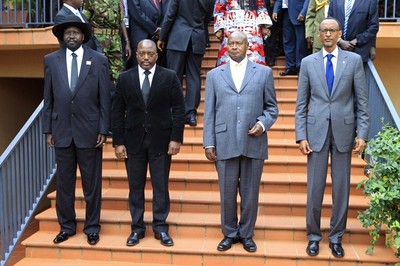Regional leaders reject direct troika role in South Sudan peace mediation
May 20, 2015 (JUBA) – Regional leaders of the Great Lakes region have rejected direct participation of troika countries (US, UK and Norway) in the mediation in the South Sudan peace process. They also rejected United Nations call for targeted sanctions and arms embargo on South Sudan.

This came in the recently concluded international conference convened by leaders of countries in the Great Lakes region, a regional grouping of 12 countries.
The leaders said troika countries should only play role of observer but should not directly involve in the peace process mediated by the East African regional bloc (IGAD).
Held in Luanda, Angola, the International Conference on the Great Lakes Region (ICGL), attended by president Salva Kiir and a number of other South Sudanese officials, also said the South Sudanese leader was an elected head of state whose legitimacy should be respected.
The leaders recognize the sovereignty and legitimacy of the government of president Kiir and resolved to designate the armed opposition force led by former vice president, Riek Machar, as “negative forces.”
“We, heads of state and government of the International Conference on the Great Lakes region, affirm the sovereignty and legitimacy of the elected government of republic of South Sudan, and commended the government for continuing to seriously engage in the peace talks despite continued violation from SPLM-IO rebels,” it said.
The regional leaders did not mention the fact that president Kiir’s elected term in office will end on Thursday, 21 May.
Observers note that designation of the armed opposition faction as a negative force would mean the region could be forced to wage war against the rebels in support of the government as it happened in Congo with M23.
Critics however argued that this designation appeared to have been engineered by some regional powers, specifically the government of Uganda whose forces are fighting on the government side in South Sudan. This explains why the opposition forces have been portrayed as the main obstacle to implementing the peace agreement.
But others believe that the real reasons why the war has dragged on for so long lies in the intransigence of both sides to reach consensus and make compromises on fundamental matters.
Juba and Kampala appear to have not read that while the regime under president Salva Kiir continues to claim the legitimacy. Critics and observers from the international community, specifically those from troika countries, see his administration as only one of the several competing factions, obliged to negotiate on equal terms with other parties to the conflict.
(ST)
